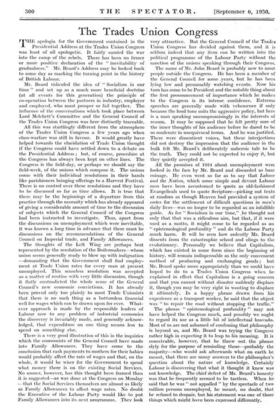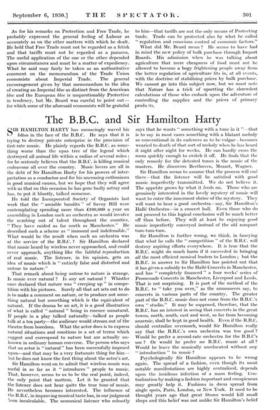The Trades Union Congress
THE apologia for the Government contained in the Presidential Address at the Trades Union Congress was least of all apologetic. It fairly carried the war into the camp of the rebels. There has been no firmer or more positive declaration of the "inevitability of gradualness." Mr. Beard's Address may be looked back to some day as marking the turning point in the history of British Labour.
Mr. Beard ridiculed the idea of "Socialism in our time" and set up as a much more beneficial doctrine (at all events for this generation) the principle of co-operation between the partners in industry, employer and employed, who must prosper or fail together. The influence of the conversations which took place between Lord Melchett's Committee and the General Council of the Trades Union Congress was here distinctly traceable.
All this was startlingly different from the atmosphere of the Trades Union Congress a few years ago when class-warfare was still in favour. It would greatly have helped towards the elucidation of Trade Union thought if the Congress could have settled down to a debate on the Presidential Address ; but, of course, procedare at the Congress has always been kept on other lines. The Congress is the field-day, or perhaps we should say the field-week, of the unions which compose it. The unions come with their individual resolutions in their hands like parishioners bringing offerings to a Harvest Festival. There is no control over these resolutions and they have to be discussed so far as time allows. It is true that there may be the beginnings of a departure from this practice through the necessity which has already appeared of giving a considerable amount of time to the discussion of subjects which the General Council of the Congress had been instructed to investigate. Thus, apart from the discussions on unemployment which were inevitable, it was known a long time in advance that there must be discussions on the recommendations of the General Council on Imperial trade, and Family Allowances.
The thoughts of the Left Wing are perhaps best represented by the resolution of the Boilermakers—whose union seems generally ready to blow up with indignation —demanding that the Government shall find employ- ment at Trade Union rates for every man at present unemployed. This senseless resolution was accepted as a matter of routine with very little discussion, though it flatly contradicted the whole sense of the General Council's new economic convictions. It has already been proved only too plainly to most Trade Unionists that there is no such thing as a bottomless financial well for wages which can be drawn upon for ever. What- ever approach is made by the responsible leaders of Labour now to any problem of industrial economics the discovery is invariably made, and generally acknow- ledged, that expenditure on one thing means less to spend on something else.
There is a very good illustration of this in the inquiries which the economists of the General Council have made into Family Allowances. They -have come to the conclusion that cash payments to mothers for their babies would probably affect the rate of wages and that, on the whole, it would be wiser for the Government to spend what money there is on the existing Social Services. No sooner, however, has this thought been framed than it is suggested—as was done at the Congress on Monday —that the Social Services themselves are almost as likely as Family Allowances to affect wage rates. No doubt the Executive of the -Labour Party would like to put Family Allowances into its next programme. They look very attractive. But the General Council of the Trades Union Congress has decided against them, and it is seldom indeed that any item can be written into the political programme of the Labour Party without the sanction of the unions speaking through their Congress.
The name of Mr. John Beard is probably new to most people outside the Congress. He has been a member of the General Council for some _years, but he has been lying low and presumably watching events. Now his turn has come to be President and the notable thing about the first pronouncement of importance which he makes to the Congress is its intense confidence. Extreme speeches are generally made with vehemence if only because the loud tone suits the aggressive policy, but here is a man speaking uncompromisingly- in the interests of reason. It may be supposed that he felt pretty sure of the inner thoughts of his audience before he dared to be so moderate in unequivocal terms. And he was justified. There were dissentient voices, but these interjections did not destroy the impression that the audience in the bulk felt Mr. Beard's deliberately unheroic tale to be the truth. They could not be expected to enjoy it, but they quietly accepted it.
All the promises of 1924 about unemployment were looked in the face by Mr. Beard and discarded as base coinage. He even went so far as to say that Labour and the Nation, which some simple and devout Labour men have been accustomed to quote as old-fashioned Evangelicals used to quote Scripture—picking out texts at random as though Heaven had provided a system of sortes for the settlement of difficult questions in men's daily lives—was no longer to be regarded as an infallible guide. As for "Socialism in our time," he thought not only that that was a ridiculous aim, but that, if it were used as a motto, it might come to be regarded as an "epistemological profundity" and do the Labour Party much harm. It will be seen how ardently Mr. Beard dissents from the catastrophic school and clings to the evolutionary. Personally we believe that Capitalism, which has existed in some form since the beginning of history, will remain indispensable as the only convenient method of producing and exchanging goods ; but Mr. Beard spoke more appropriately than we Could have hoped to do to a Trades Union Congress when he explained in effect that Capitalism is a going concern and that you cannot without disaster suddenly displace it, though you may be very right in wanting to displace it ultimately. In a happy phrase drawn from his experience as a transport worker, he said that the object was "to repair the road without stopping the traffic."
The phrase "epistemological profundity" may not have helped the Congress much, and possibly we ought to regard its use as a little bit of intellectual bravado. Most of us are not ashamed of confessing that philosophy is beyond us, and Mr. Beard was trying the Congress rather high in expecting it:to leap to his meaning. It, is conceivable, however, that he threw rout the phrase slyly for the purpose of reminding those—probably the majority—who would ask afterwards what on earth he meant, that there are many answers to the philosopher's question about the nature of knowledge. Certainly Labour is discovering that what it thought it knew was not knowledge. The chief defect of Mr. Beard's honesty was that he frequently seemed to be tactless. When he said that he was "not appalled" by the spectacle of two million persons unemployed, he meant, no doubt, that he refused to despair, but his statement was one of those things which might have been expressed differently,
As for his remarks on Protection and Free Trade, he probably expressed the general feeling of Labour as accurately as on the other matters with which he dealt. He held that Free Trade must not be regarded as a fetish and that tariffs must not be regarded as a panacea. The useful application of the one or the other depended upon circumstances and must be a matter of expediency. What he said may fairly be taken as an authoritative comment on the memorandum of the Trade Union economists about Imperial Trade. The general encouragement given by that memorandum to the idea of creating an Imperial bloc as distinct from the American bloc and the European bloc is unquestionably Protective in tendency, but Mr. Beard was careful to point out— for which some of the aforesaid economists will be grateful to him—that tariffs are not the only means of Protecting trade. Trade can be protected also by what he called "regulation and conscious control of economic factors."
• What did Mr. Beard mean ? He seems to have had in mind the new policy of bulk purchase through Import Boards. His admission when he was talking about agriculture that mere cheapness of food must not be allowed to become a bogy frightening people away from the better regulation of agriculture fits in, at all events, with the doctrine of stabilizing prices by bulk purchase. We cannot go into this subject now, but we must note that Nature has a trick of upsetting the shrewdest calculations of those who embark upon the adventure of controlling the supplies and the prices of primary produ































 Previous page
Previous page